Tun Omar Yoke-Lin Ong
The Last Independence Fighter
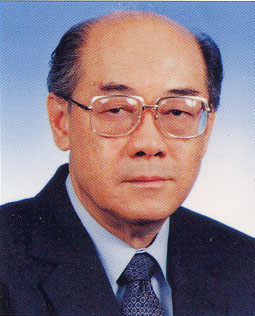

hat would be the political scene in Malaysia today if Ong Yoke Lin hadn't taken a wrong turn one Sunday morning early in 1952 while driving to his office in Ampang Road? As it happened he found himself driving instead past the Cold Storage in Rodger Street (Jalan Hang Kasturi today). Outside, he spotted his former V.I. schoolmate Yahya bin Abdul Razak, a Selangor territorial chief and chairman of the UMNO election subcommittee. He motioned to Yahya to jump into his car and the two of them drove to Yoke Lin's office. There, after a half-hour discussion, a momentous decision was made in the political history of Malaysia that resounds to this day.
To understand what happened one must rewind the clock back to 1951 when there was the Member system under the British. Dato Onn bin Jaffar was the "Member" for Home Affairs, Dato Thuraisingam was the "Member" for Education, Nik Kamil (former Mentri Besar for Kelantan} was the "Member" for Lands and Mines. Despite the on-going Emergency, the British High Commissioner had promised the Malayan people local council level elections for town councils and municipal councils. If things went well at the local level, then elections would be held at state level and, after that, at federal level.
A few political parties including UMNO and Yoke Lin's MCA began to gird
themselves for the elections. Dato Onn was then the president of Umno. He wanted to open
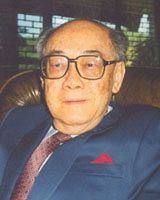 Umno to all races but the other Umno leaders at that time did not support that idea. So Onn
resigned and founded the multiracial Independence of Malaya Party (IMP). It attracted
many supporters and, as 1952 began, the IMP had selected its candidates and was confident
of winning the majority, if not all, of the twelve seats for the Kuala Lumpur
Municipal Council.
Umno to all races but the other Umno leaders at that time did not support that idea. So Onn
resigned and founded the multiracial Independence of Malaya Party (IMP). It attracted
many supporters and, as 1952 began, the IMP had selected its candidates and was confident
of winning the majority, if not all, of the twelve seats for the Kuala Lumpur
Municipal Council.
Ong Yoke Lin who was at that time Chairman of the Selangor liaison committee was perplexed when even MCA bigwigs like its President Cheng-Lock Tan, Leong Yew Koh, and Tan Siew Sin were falling over themselves to join the IMP. He confronted Cheng-Lok Tan (later Tun) to ask what it was all about. "No, no, no", Cheng-Lock explained, "I am joining in my personal capacity. I am still national president of the MCA!" Then UMNO, under its new President Tunku Abdul Rahman, announced that it was fielding six candidates for the elections. In response the MCA made a call for a multiracial slate of candidates.
It was in this atmosphere of political maneuvering and posturing that Yoke Lin had that chance meeting with UMNO's Yahya Abdul Razak. It was only possible because Yoke Lin was the only MCA official that Yahya - vested with the authority to do whatever he could to win for UMNO - knew and trusted personally, thanks to their V.I. roots. So in the registered office of Ong Yoke Lin & Company overlooking the Klang River was hatched the concept of an UMNO-MCA Alliance to contest the coming Municipal elections.
Born on July 23, 1917, Yoke Lin began schooling at the Pudu Girls' English School, which was a mere shop house then. He then continued at the High Street V.I. and tranferred to the new VI in 1929 for his Standard Six. He finished his School Certificate in 1932 at the age of 15. The headmaster at time was Mr F.L. Shaw, a classics scholar from Cambridge. He taught Yoke Lin Latin, so interestingly and so well that he was the only V.I. boy to get honours in that subject. Mr Leong Fook Yen was his geography teacher, while Mr Ganga Singh taught him mathematics.
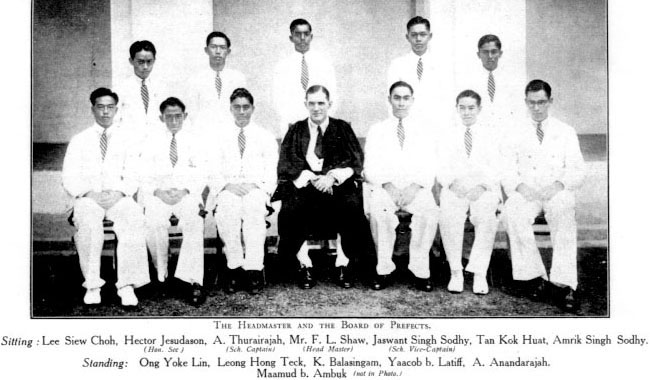
In Yoke Lin's time, the V.I. was one of those exclusive schools like the Penang Free School, with three feeder primary schools - Pasar Road School, Batu Road School and Maxwell School. Only the best from these schools went to the V.I. His classmates included Yahya Razak, School Captain Bahauddin bin Yaacob and Jeswant Singh Sodhi. A member of Shaw House, he was involved in football and played badminton for the school. He joined informal badminton clubs like the Evergreen Club, Jolly Ones Club that met after school and under their auspices played against future Thomas Cuppers like Wong Peng Soon and Chan Kon Leong. He even had a few matches with Mr Shaw in the School Hall. Yoke Lin also dabbled in drama and once, as a thirteen year old under the direction of the Art teacher, Mr Chan Hung Chin, he had to put on a wig and a dress to act as a girl.
The secret of the V.I. was that it had good teachers, who were either Cambridge,
Oxford or London graduates. They were all very dedicated. And the local teachers were good too.
There was a spirit of competitiveness and a sense of pride in the school that made the Victorians
want to compete against other schools for better results and for the glory of the school. There
were all sorts of extramural activities that allowed for the easy mixing of boys of various races
- hence the bonding between Yoke Lin and Yahya Razak. Yoke Lin was in the cadet corps and the
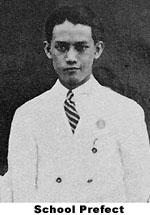 scouts as well. In the former he was promoted to sergeant-major, training other recruits. He was
very active in the geographical society and in the debating society where, after overcoming his
initial nervousness, he honed his debating skills, skills no doubt useful later in the K.L. municipal
chambers and, much later, in the Malayan Parliament and, beyond that, the United Nations.
scouts as well. In the former he was promoted to sergeant-major, training other recruits. He was
very active in the geographical society and in the debating society where, after overcoming his
initial nervousness, he honed his debating skills, skills no doubt useful later in the K.L. municipal
chambers and, much later, in the Malayan Parliament and, beyond that, the United Nations.
He was made a school prefect; one of his fellow prefects was Lee Siew Choh who would later carve his name in politics as well, except it would be in Singapore and of a different, more fiery brand. Another colleague was Yaacob bin Latiff, destined like Yoke Lin to serve as an ambassador for the country and who would later be appointed mayor of Kuala Lumpur. Yet another was Mahmud bin Ambak, the late father-in-law of the present Malaysian Prime Minister. As prefects, the job of Yoke Lin, Siew Choh, Yaacob, Mahmud and others was to apprehend the boys who came late to school. They would lock the school gates after lessons began and apprehend latecomers to be caned on the buttocks by Mr Shaw to inculcate into them that punctuality was a very important part of life. All in all, Yoke Lin thoroughly enjoyed his time at the V.I., and came away with many happy memories, good friends as well as lifelong friends.
On finishing his School Certificate, Yoke Lin was offered a Loke Yew Scholarship to Hong Kong University to read either medicine, engineering or the arts. But he was keen to go to England for Mr Shaw had called him in and said he wanted him to win a Queen's scholarship for the glory of the V.I. Yoke Lin tried for two years but lost out to some Taiping boys who were offering mathematics as a subject. Of course, in mathematics - a subject not offered in V.I.'s matriculation class - one could score 100% while in Latin or History one could not. In 1935, Yoke Lin finally sat for the London matriculation - a very difficult exam - in Singapore and passed in all his five subjects. In 1936 he joined the work force selling air-conditioners, while training as a chartered accountant at a firm called Gibson, Anderson, Butler, whose partners treated him very well.
When he first started selling air conditioners before the war Yoke Lin could not get enough electricity to run his products. Electricity was reserved mainly for the use of the tin dredges and one large British manufacturing facility, United Engineers. There were few factories, and the big businesses were all British owned. One could see that the best roads were all built for tin mines and rubber plantations. There was little hope for good jobs, recalls Yoke Lin. Malaya's two main commodities, rubber and tin, depended on the vagaries of the market. Malayans were producers of only raw materials with no value added for what they produced. Apart from that, they were just distributors, wholesalers and retailers. It was sheer colonial exploitation in the classic sense, says Yoke Lin.
He had been hoping to read law but then the war intervened. After the war he founded his air-conditioning firm, Ong Yoke Lin & Company, in 1948 which is still going strong today. Not surprisingly he plunged into politics and joined the MCA in 1949. He had risen to be an executive committee member of its Selangor branch (under Colonel H.S. Lee) by the time he met with Yahya Razak that fateful Sunday morning.
When Yoke Lin broached the UMNO-MCA Alliance idea with Cheng-Lock Tan, the latter said "Yes, yes, I support it. Anything that brings the races together is good." The inauguration of the UMNO-MCA Alliance in KL planned for another Sunday morning was another thing though. Tunku Abdul Rahman promised to attend, as did Cheng-Lock. When the Tunku turned up, there was no Cheng-Lock anywhere. As the MCA President usually stayed at the Majestic Hotel whenever he came up from Malacca, Yoke Lin sent his boys to the hotel to fetch him. The hotel said yes, Cheng-Lock had arrived at 9 o'clock that morning but, no, he had left at half past nine. What happened was that Cheng-Lock had been "kidnapped" by the IMP people and so never turned up for that historic UMNO-MCA inauguration!
Nevertheless the upshot was that the Alliance won a big victory in the Kuala Lumpur Municipal Council election, forming the majority. Yoke Lin was chosen as Alliance leader in the Municipal Council. The UMNO-MCA Alliance juggernaut now spread like wild fire all over the country from Johor Baru to Kangar. Every weekend they had elections in some town in Malaya and the Alliance would win 90% to 100% of the seats. Meantime the IMP had suffered so many defeats in the local elections that Dato Onn dissolved it and formed Party Negara in its place. When the local elections were all over, Yoke Lin invited the Tunku and Cheng-Lock Tan to sit down and talk, saying, "The Malays and Chinese are now comfortable working together. We should now discuss all the various big issues for independence." And so they had round table conferences and after many meetings agreed on a strategy to fight for the next goal - independence.
The Federal Legislative Council at that time consisted of 100% appointed
members, including Yoke Lin himself. He also wore two other hats, as an appointee to the
Selangor State Legislative Assembly as well as an elected member of the KL Municipal Council.
Now he and others in the Alliance began to pressure the colonial government to hold national
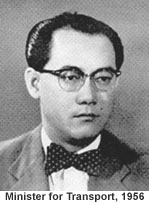 elections to elect two thirds of the legislative seats. The British agreed to only one third
and things reached a stage where the talks broke down and the Malayans members simply resigned
and called for a non-cooperation campaign.
elections to elect two thirds of the legislative seats. The British agreed to only one third
and things reached a stage where the talks broke down and the Malayans members simply resigned
and called for a non-cooperation campaign.
The communist insurgency was then at its height, with more Commonwealth
troops having to be brought in and more special police recruited. The British press now
joined in the fray and criticised the ruling Conservative government's stand, while the
opposition Labour Party was saying, "You are now fighting on two fronts. You are fighting
the communistis and you are not achieving any significant victory yet. And now you are taking
on the nationalists!" In the end the British came up with a compromise: 52 seats with the
majority party appointing seven more making up a possible 59. Yoke Lin and the rest accepted
the compromise and the Alliance, which by this time included the MIC, participated in the
landmark 1955 national election. It won 51 out of 52 seats, appointed seven more members, and
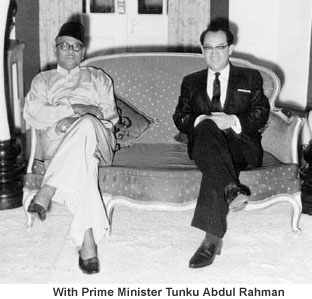 so had an overwhelming majority in the house. The Tunku became Chief Minister; Yoke Lin was
made Minister for Post and Telecoms in the first cabinet and, after a few months, moved to
Transport.
so had an overwhelming majority in the house. The Tunku became Chief Minister; Yoke Lin was
made Minister for Post and Telecoms in the first cabinet and, after a few months, moved to
Transport.
And now it was on to the final lap - negotiating for complete independence from Britain. An Alliance delegation led by Tunku Abdul Rahman flew to London and inked an agreement in January 1956 for Merdeka to be granted in an unexpectedly short period of nineteen months. With independence assured, new issues were now raised, in particular, the creation of a formula for a common nationality for all the races. Yoke Lin was in the committee to draft proposals to submit to the Reid Commission which toured Malaya in 1956 receiving memoranda and hearing evidence in camera. There was substantial agreement to the Alliance's draft document and the final points were to be agreed in London in 1957. The Alliance delegation in this particular round comprised the Tunku, Abdul Razak, Sambanthan, Yoke Lin together with representatives of the Malay rulers. The tripartite talks went quite smoothly, presided over by the Colonial Secretary, Alan Lennox-Boyd. The Malayan delegation even talked to the British Prime Minister, Harold Macmillan, and the Foreign Secretary. All that remained now was to prepare for Malayanization and Merdeka.
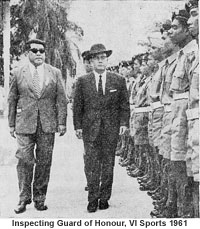
When Malaya proclaimed its independence on August 31st 1957, it was at the brand new Merdeka Stadium in the back yard of Yoke Lin's old school. With the V.I. tower peering over the stadium in front of him, he sat with other ministers, resplendent in the colonial-style white uniform with ostrich-plumed helmet of that era. It was, Yoke Lin recalls, the happiest moment of his life. His struggle was over; tears of joy streamed down his cheeks. On that day, too, he became Minister for Labour and Social Welfare of a brand new country under Prime Minister Tunku Abdul Rahman. Two years later, he was switched to head Health and Social Welfare.
Having fought for Malaya's independence Yoke Lin was soon roped in to
help with the difficult birth of Malaysia. By 1961 the Tunku's idea of forming Malaysia
from Malaya and the disparate pieces of Britain's southeast Asian empire was gathering
momentum. Yoke Lin led a delegation from Malaya as part of the Solidarity Consultative
Committee comprising delegations from Malaya, Singapore, Sarawak and British North Borneo,
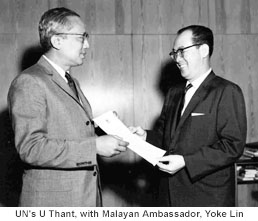 with Brunei as an observer. As agreement was reached to form Malaysia, Indonesia led by
Sukarno fell under the influence of the PKI and instituted its Konfrontasi against
Malaysia. With a serious potential for war in Southeast Asia, Yoke Lin was dispatched as
ambassador to the United Nations and the U.S. in New York. Now on the world stage, he was
in a different struggle, to defend Malaya's interests, lobbying endlessly with the Kennedy
administration and other governments to seek support for the Malaysian concept. Finally, U
Thant, the U.N. Secretary-General, sent an independent mission to ascertain the wishes of
the people of Sarawak and British North Borneo as to whether they were wanted to join
Malaysia. The report was positive and he was one of the signatories of the London agreement
in September 1963 establishing Malaysia. Yoke Lin could claim, which few could do, to have
helped launch two new nations.
with Brunei as an observer. As agreement was reached to form Malaysia, Indonesia led by
Sukarno fell under the influence of the PKI and instituted its Konfrontasi against
Malaysia. With a serious potential for war in Southeast Asia, Yoke Lin was dispatched as
ambassador to the United Nations and the U.S. in New York. Now on the world stage, he was
in a different struggle, to defend Malaya's interests, lobbying endlessly with the Kennedy
administration and other governments to seek support for the Malaysian concept. Finally, U
Thant, the U.N. Secretary-General, sent an independent mission to ascertain the wishes of
the people of Sarawak and British North Borneo as to whether they were wanted to join
Malaysia. The report was positive and he was one of the signatories of the London agreement
in September 1963 establishing Malaysia. Yoke Lin could claim, which few could do, to have
helped launch two new nations.
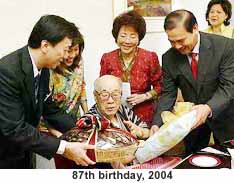
He continued his stewardship as Minister without Portfolio to the new nation. Yoke Lin was appointed concurrently as Malaysia's first High Commissioner to Canada in 1966 and as Malaysian Ambassador to Brazil the following year. He relinquished his diplomatic appointments in November 1972 and resumed his Ministerial post until February 1973 when he was unanimously elected President of the Senate. He served in this position until December 31, 1980.
Today, Yoke Lin, or Tun Omar Ong - he has since embraced Islam and been awarded a Tunship for his services to the nation - enjoys a busy life with interests in several companies and as patron of the National Heart Foundation. With his wife, Toh Puan Aisyah Ong at his side, he works the social circuit. His recent 87th birthday was celebrated with the top brass of his old MCA which included V.I. Old Girl politician Datuk Dr Ng Yen Yen. The MCA of his time is still around but the Alliance party has since morphed into the ruling multi-party Barisan Nasional. It must have given Tun Omar great pride to recall how his life's mission had come to fruition, 52 years after he and another Old Victorian first got together one Sunday morning to talk politics.
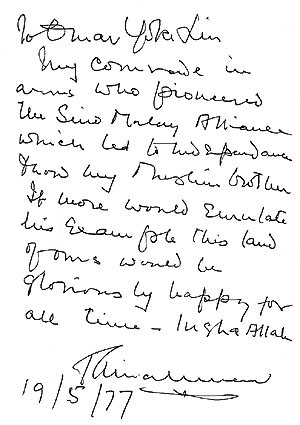
|
Monday, April 2, 2001
Millenium MarkerFirst step to independence
By Neil Khor Jin KeongSEATED comfortably in the living room in his house at Persiaran Duta, Kuala Lumpur, Tun Omar Yoke Lin Ong recalls with great precision the important events that Malaya's first Cabinet was involved in during its pursuit of independence; the 84-year-old has no problem remembering the challenges he and his fellow ministers faced in forming a stable government.
The first tentative steps towards that objective were taken in 1952. Omar (then Ong Yoke Lin) was chairman of the MCA liaison committee of Selangor then. Umno in Kuala Lumpur was led at the time by Datuk Yahya Razak, a classmate of Omar's at the Victoria Institution. During the Kuala Lumpur Municipal Elections that year, Omar and Yahya proposed an alliance between Umno and MCA to face the challenge from Datuk Onn Jaafar's Independence of Malaya Party (IMP).
"The Tunku (Abdul Rahman Putra), then Umno president, gave us his wholehearted support," explains Omar. Tun Tan Cheng Lock's position, however, was less clear. Tan, who was MCA national president, was also a member of the IMP. "His son, (Tun Tan) Siew Sin," Omar recollects, "came to one of our rallies and asked to use the microphone. He proceeded to warn us not to use his father's name in vain." Tan Cheng Lock, like many MCA members, was attracted to the IMP's open, multi-racial membership.
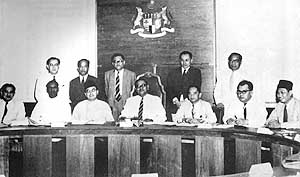 Tunku Abdul Rahman's first cabinet at its
first meeting on Sept 10, 1957. Tun Omar Yoke Lin Ong
(standing far left) was then Labour and Social Welfare
Minister. - Picture from `Tunku: A pictorial Biography,
1903-1957' (Pelanduk Publications).
|
History books mostly credit Tun Sir H.S. Lee as the architect of the "Kuala Lumpur Alliance" as he was then Selangor MCA chairman. However, it is clear that there were many individuals responsible for the founding of the historic Umno-MCA alliance for the KL election. Perhaps those most responsible are the voters in Kuala Lumpur. They settled all doubts when they gave the alliance nine of the twelve seats in the council. The formula stood the test of the 1952 Municipal Election and became the model for a national-level alliance. That year, the MIC, under the leadership of the late Tun V.T. Sambanthan joined the alliance, further strengthening it.
The founding of the Alliance Party based on the formula of multi-racial cooperation demonstrated by the earlier alliance in KL was an instant hit with the people. The IMP's defeat revealed that Datuk Onn's vision of a multiracial party was ahead of its time. Voting patterns were still very much determined along racial lines at this time. Thus, racial cohabitation under the Alliance Party umbrella gave each race confidence and opportunity for participation in government.
Omar, however, felt that Onn's departure from Umno was a loss to that party even though "many members of the executive committee of Umno opposed his proposal to open Umno to the non-Malays." Tun Abdul Razak Hussein, with support from Tun Dr Ismail Abdul Rahman, then approached the Tunku to lead Umno. The Tunku really knew what the people wanted then, said Omar, because, once at Umno's helm, the Tunku changed the party's slogan from "Hidup Melayu (Long Live the Malays)" to "Merdeka (Independence)".
"Merdeka was such a powerful force. It galvanised the people and transcended race." The ultimate test, however, was the first national election in 1955. According to Omar, the British never thought the Alliance Party would win with such an overwhelming majority. "They had hoped for a divided victory and, thus, a weak government. When the Alliance won 51 out of 52 seats, Merdeka was in our hands," Omar related with relish. "We then proceeded to form the first Cabinet."
Dealing with the Malayan Communist Party (MCP) and its armed insurrection was the second most important matter on the agenda of the first Cabinet, preceded only by the effort to gain Malaya's independence. By 1955, the communists had been sufficiently weakened and requested for a meeting with the Malayan government. The Tunku, representing the voice of the people, attended the famous Baling talks with the MCP's leader Chin Peng. "By then, we were quite sure that we would win the 'shooting war', especially after so many communists surrendered because we offered them amnesty," said Omar.
"We even took the risk of declaring certain 'black areas' white as we saw the reaction was good from the people," he recalled. However, he added that Chin Peng's motto was, "once a communist always a communist''. That, perhaps, explains the first Cabinet's uncompromising stance on the CPM's conditions for surrender.
The first Cabinet had also promised Malayans that independence would be achieved by Aug 31, 1957. It had much to do to achieve that, not the least of which was dealing with British reluctance. Omar explained that "the British never thought we would be able to form a stable government so quickly and were, thus, caught unprepared."
In fact, Omar said that many cabinet meetings were held in the Tunku's residence. "We were not provided with proper offices. The Tunku's bungalow was in such bad condition that it hardened his resolve to achieve Merdeka," Omar recalled with a smile. Meetings were held to discuss the creation of a Constitution suitable for all Malayans and preparations were made to take over from the British. Omar noted that although these were important times with urgent issues, working under the Tunku was very relaxed.
In April 1957, Omar was among four Cabinet ministers selected to represent the Alliance Party in London to finalise the Constitution. "The British were cooperative," Omar recalled "and the Tunku performed very well." As a team, the first Cabinet worked very well together, said Omar. The Tunku's cabinet meetings almost always came to unanimous decisions because, "everyone shared the same vision of creating a happy nation".
On a personal note, Omar explained that although the Tunku was perceived as being pro-Chinese by Malay nationalists, he was "equally as pro-Malay and as pro-Indian. He was a true Malayan." "Under the statesmanship of the Tunku," Omar stressed, "the nation came together and with that unity, Malaya won its independence."
Omar's relationship with the Tunku was very close; Tunku even visited Omar's house to cook his famous Yorkshire pudding for Omar! Omar is not one to dwell on personal matters, though, and, after taking a sip of his tea, he proceeded to describe the euphoria of Merdeka and the sober challenges facing the 1957 Independence Cabinet. "The task of running the country was now the sole responsibility of the new government," Omar explained.
Fortunately, although the 1957 Cabinet was no longer transitional - previously, key portfolios like Defence and Finance were under British control - it still had the support of the British-led Civil Service and Army. Commenting on the working relationship of the Independence Cabinet, Omar explained that it was Tun Abdul Razak who was the technocrat. "He worked in the rural areas bringing development there and he planned for the country."
On his third portfolio as Labour and Social Welfare Minister, Omar smilingly reported that, "the bus system was a problem." He also recalled that Penang's port had silted up and that unemployment in that state reached a 20% high at one point, thus causing much unrest. "Penang was volatile and there were many demonstrations. Priority was given to Penang when it came to foreign investments. The Federal government helped develop Penang."
Omar also agreed with Tun Razak that a Penang bridge should be built instead of an underwater tunnel because the former would be more visible. The biggest task of the 1957 Cabinet was to bring development to the people. Omar feels that, in many ways, Malaysia was a success as it never incurred huge foreign debts and kept up to world standards its civil service, its judiciary and its institutions of higher education.
But above all other objectives, it was the first Cabinet's vision that all Malaysians should unite for peace and progress. A vision to be revisited, perhaps, in these trying times?
A lifetime in politics
TUN Omar Yoke Lin Ong began his career as a businessman and presently sits on the board of several public-listed companies. His political career spans 50 years. He was a founding member of the MCA, a Federal Legislative Council member, leader of the majority party of the Kuala Lumpur Municipal Council and a Selangor State Council member.
In 1955, after the Alliance Party's resounding victory, Omar was appointed Malaya's first Posts and Telecoms Minister. The following year, he assumed the position of Transport Minister and, upon independence, he became Labour and Social Welfare Minister. He was returned in the 1959 election and was appointed Health and Social Welfare Minister. He was also Acting Minister of Defence, Commerce and Industry and Agriculture.
From 1962 to 1972, Omar was Malaysia's ambassador to the United States and Brazil, Permanent Representative to the United Nations and High Commissioner to Canada. He was, until 1973, Minister Without Portfolio. He was later appointed President of the Senate, a post he held till 1980.
Members of the first Cabinet
Tunku Abdul Rahman Putra -- Chief MinisterTun Abdul Razak Hussein -- Education
Tun Dr Ismail Datuk Abdul Rahman -- Natural Resources
Tun Henry Lee Hau Shik -- Transport
Tun Leong Yew Koh -- Health and Social Welfare
Tun Omar Yoke Lin Ong -- Posts and Telecoms
Tun V.T. Sambanthan -- Labour
Tan Sri Haji Sardon Jubir -- Works
Datuk Suleiman Abdul Rahman -- Housing, Local Government and Town Planning
Abdul Aziz Ishak -- Agriculture and Cooperative
Members of the Independence Cabinet
Tunku Abdul Rahman Putra -- Prime Minister, Defence, Foreign AffairsTun Abdul Razak Hussein -- Deputy Prime Minister, Defence (1958)
Abdul Aziz Ishak -- Agriculture and Cooperative
Tun Dr Ismail Datuk Abdul Rahman -- Trade and Security
Tun Henry Lee Hau Shik -- Finance
Tun Omar Yoke Lin Ong -- Labour and Social Welfare
Tun V.T. Sambanthan -- Health
Tan Sri Haji Sardon Jubir -- Works, Posts and Telecoms
Datuk Suleiman Datuk Abdul Rahman -- Natural Resources and Local Government
Abdul Rahman Talib -- Transport (1958)
Tun Leong Yew Koh -- Justice (1960)
Tan Sri Mohamad Khir Johari -- Education (1958)
Tun Tan Siew Sin -- Trade and Industry (1958), Finance (1960)
 The V.I. Web Page
The V.I. Web PageCreated: August 15, 2004.
Last updated: December 28, 2015.